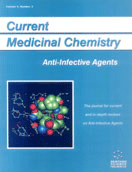Abstract
The hepatitis C virus infects an estimated 1-3% of the world population. A large proportion of individuals afflicted by this rapidly spreading epidemic eventually progress to chronic liver disorders. Liver failures associated with chronic hepatitis C infections are the leading cause for liver transplantations in the US. Currently, the backbone of anti-HCV therapy, consisting of various forms of interferon in combination with broad-spectrum antivirals such as ribavirin, has only met with limited success. This review will provide coverage of recent efforts towards the development of novel antiviral strategies that target inhibition of essential enzymatic functions encoded by the non-structural region of the HCV genome. These include principally, inhibition of the NS3 protease and helicase, and of the NS5B RNA-dependent RNA polymerase.
Keywords: Hepatitis c infection, Non-structural proteins, Hepatitis c virus, Ns3 protease, Benzimidazole-containing inhibitors, Inhibition of ns3 helicase, Ns5b polymerase
 9
9

